Has Munawar Faruqui become Dongri’s most famous face, beating veteran poster boy Dawood Ibrahim? Inspired by Bigg Boss’s latest champion, the notorious neighbourhood’s creators and influencers say danger is muse, the future is bright
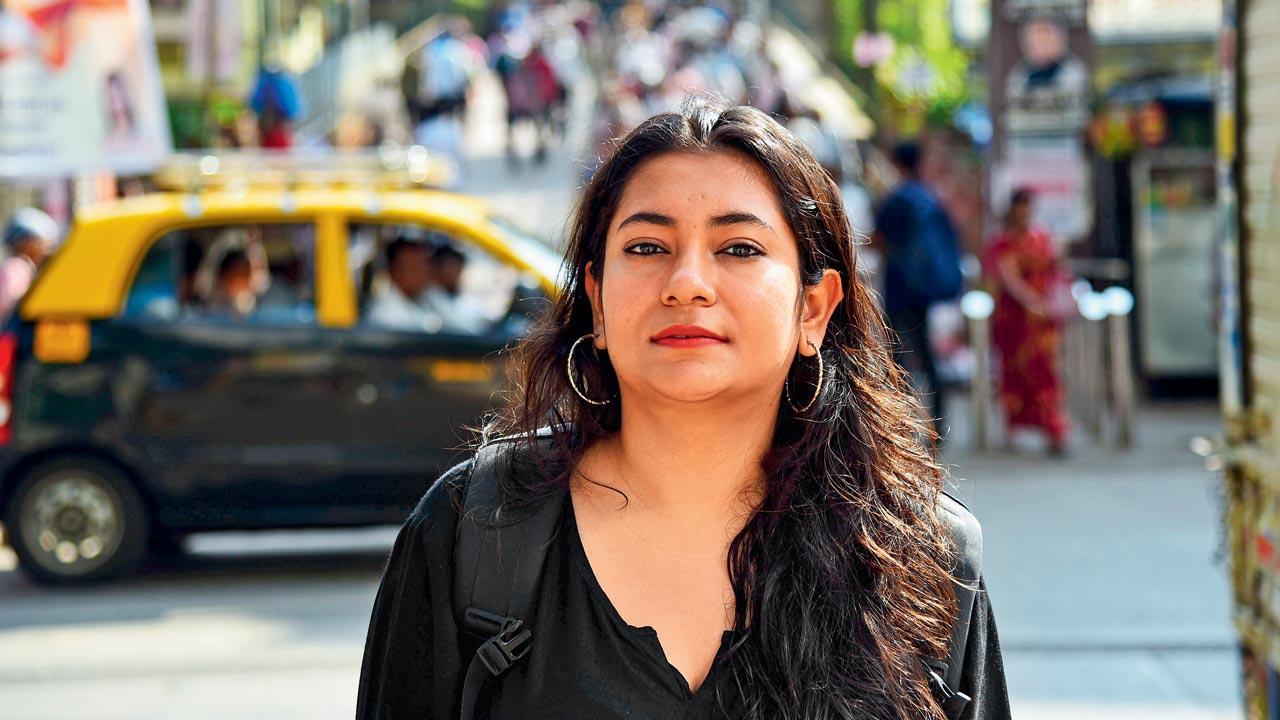
Stand-up comic Sumaira Shaikh, 30, the daughter of a car salesman who didn’t go to school, lost her brother to drug addiction. Her first OTT special, Dongri Danger, was inspired by her roots. Pic/Nimesh Dave
Everyone asks me why I walk so fast. Then, when they come to Dongri, they get it!” Sumaira Shaikh is offering us a crash course on negotiating Kesar Baug on Jama Masjid Road, where she says, “you can’t chill as you walk. Hurry or get out of the way.”
Shaikh, 30, is a stand-up comic who has agreed to take us on a tour of her mohalla. It was at Hazrat Imam Chowk, that stands right ahead of us, that last week, a snaking, swirling sea of fans and well-wishers gathered to welcome stand-up comic, poet and rapper Munawar Faruqui after the 32-year-old old lifted the Bigg Boss season 17 trophy, flashing it at the crowd through the sunroof of his car. The turnout, which left the police in a tizzy, was unprecedented for a comedian. Onlookers say the frenzy was comparable only to crowds that turn up outside superstar Shah Rukh Khan’s home on the eve of his birthday. In celebration of one of their own winning Indian television’s biggest reality show, eateries offered discounts on bills and posters cropped up at lampposts congratulating the Dongri chhokra. Reports also suggested that one fan was booked for flying a drone to capture the celebrations without police permission. The Junagadh native’s following was evident in 2022 as well when he won the Kangana Ranaut-fronted reality television series, Lock Upp: Badass Jail, Atyaachari Khel!
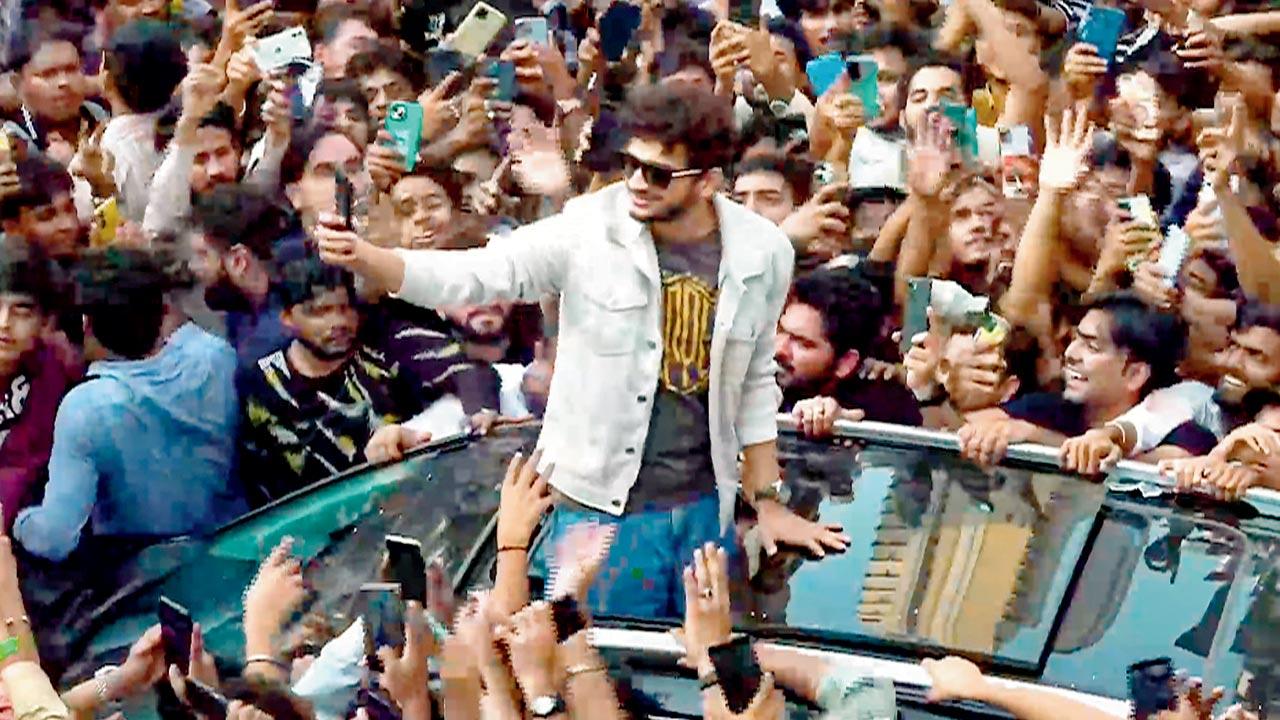 Munawar Faruqui got a thunderous welcome in Dongri last week when he visited after winning the reality show
Munawar Faruqui got a thunderous welcome in Dongri last week when he visited after winning the reality show
Last week’s homecoming was a sweet revenge of sorts for him, and redemption for a community that sees itself in his struggles. Faruqui, the son of a driver who dropped out of school and did odd jobs before finding his calling on stage, hit a nasty patch in 2021, when he was arrested on New Year’s Eve after members of a right wing organisation stormed his Indore show venue. He was set to wrap up his India tour and was readying for a show in Dubai. The joke surrounding Mera piya ghar aya, oh Ramji, a popular Bollywood number starring Madhuri Dixit, was not on his set that evening. It was an old joke that was up on his YouTube channel, which currently boasts 4.7 million subscribers. For that year-old joke, he received threats and police complaints had been filed. The crowds rose in support of Faruqui that night, hooting, clapping. He was arrested right after. If he got out, he’d be re-arrested for another case filed in UP. He was finally granted bail a month later, and he went back to doing what he does best.
Dongri, a ghetto in one of South Mumbai’s oldest parts, has often been inspiration for Faruqui’s content. The video, Dawood, Yamraaj & Aurat from 2020 now has 20 million views. In it he says, “When I say I am from Dongri, half of the people don’t know where that is, and the other half say, ‘Dawood wala?’ So, then I say, ‘Kya Dawood, there is also Haji Mastan, Tiger Memon…”
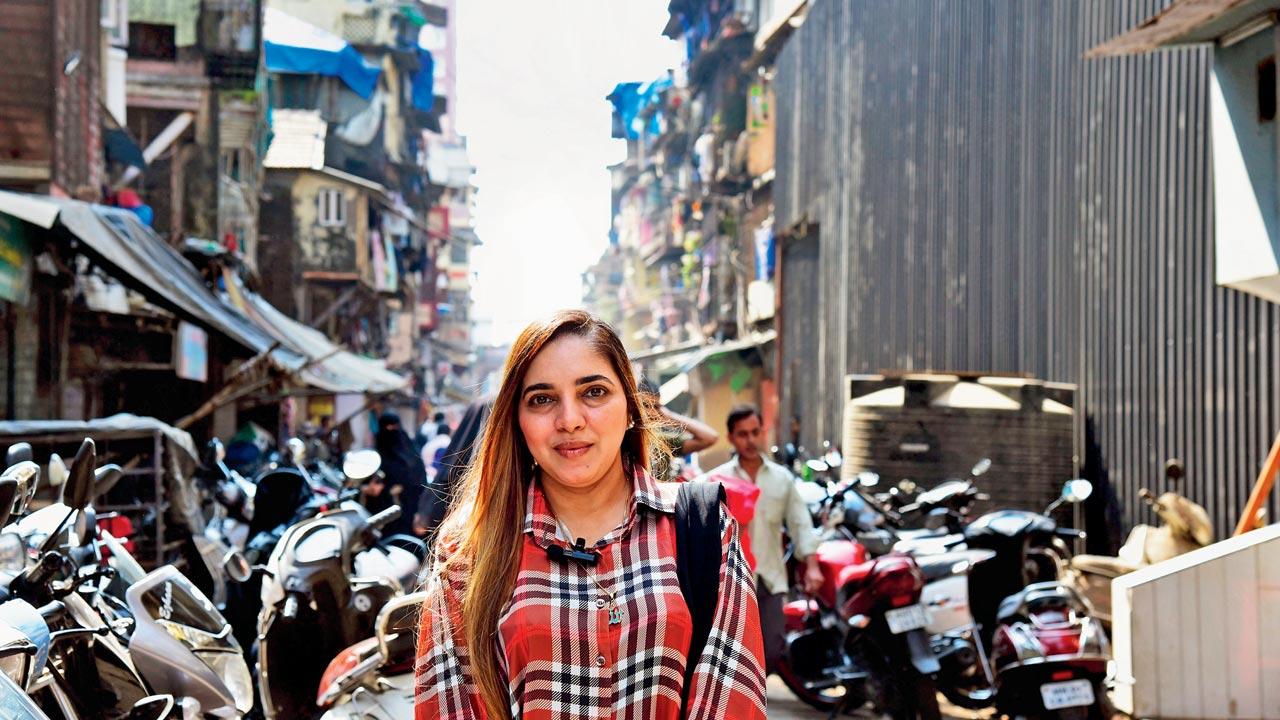 Influencer Samira Furkan is the first woman in her community to step out and make a career for herself
Influencer Samira Furkan is the first woman in her community to step out and make a career for herself
There are more: Karim Lala, Yusuf Batla, Moin Totla and of course, Dawood Ibrahim Kaskar, underworld kingpin and chief accused in the 1993 Mumbai blasts. Kaskar was born Bollywood-style in 1955 to a policeman father. He grew up in the Zadgaon area of Dongri, and started the D-Company, which initially included other famed gangsters, Chhota Shakeel, Tiger Memon, Yakub Memon, and Abu Salem.
Faruqui has said on record that his home was burned during the 2002 Godhra riots, which followed an attack on a train carrying Hindu pilgrims that left several of them dead. His father moved to Mumbai after the death of his mother. Faruqui lost his father in 2020. “He didn’t have lofty dreams. He just wanted to make some money,” his friend and fellow comic, Sagar Punjabi, told this newspaper in 2021. Faruqui did this by working at a utensils store, where he was paid Rs 60 for a 13-hour shift. It’s from here that he found his stories. His first hit travelling show, called Dongri to Nowhere, saw packed venues across the country.
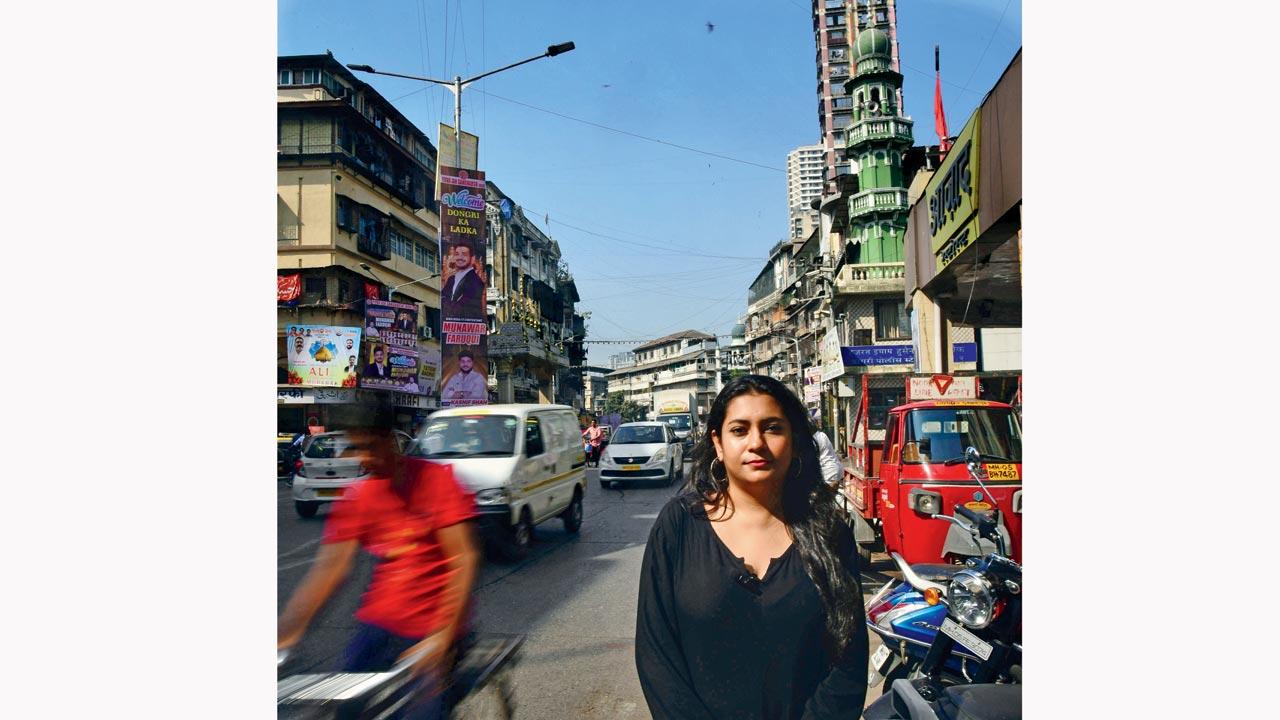 Stand-up comic Sumaira Shaikh was once ashamed of saying she is from Dongri, but has since embraced it. Pics/Nimesh Dave
Stand-up comic Sumaira Shaikh was once ashamed of saying she is from Dongri, but has since embraced it. Pics/Nimesh Dave
Shaikh draws hope from this success. “He has put Dongri’s name on a platform as big as Bigg Boss. That’s huge [for us]. We now feel seen, represented. They [residents] are saying, ‘thank you for taking our [neighbourhood’s] name’,” she says.
It’s not a neighbourhood that’s enjoyed a good rep. Roaming its streets was considered dangerous thanks to its notorious residents. It’s why Shaikh chose to call her Amazon Prime Video special Dongri Danger. In it, she quips, “I don’t know Dawood. What would be problematic is if Dawood knew you!”
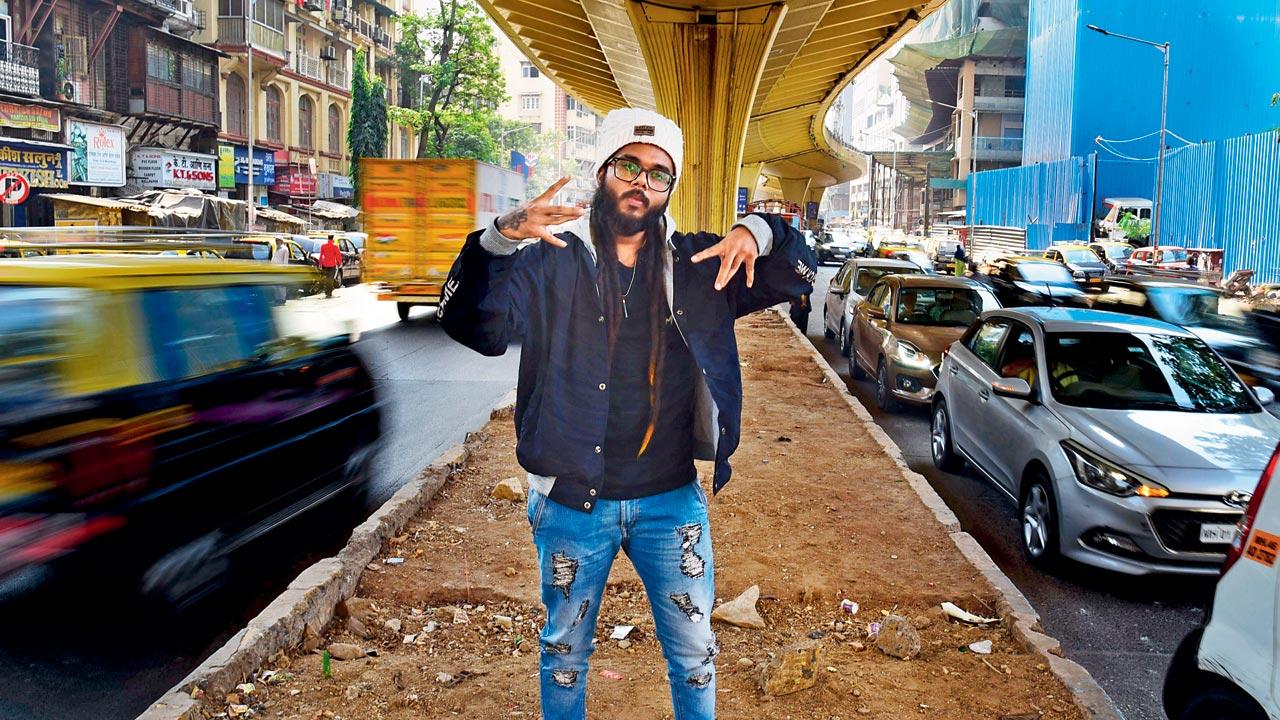 Shashank Katkar, aka Jazzy Nanu, feels that living in Dongri has taught him to make astute observations, which make their way into his rap
Shashank Katkar, aka Jazzy Nanu, feels that living in Dongri has taught him to make astute observations, which make their way into his rap
Shaikh’s day job is as writer with a Bandra content house. She owes this life to her father, a pukka Dongri man, who couldn’t go to school. “My first special had to be about where I come from.” She says in the special: “Rich people want to travel to see poverty. If I want to see gareebi, I can look outside my window”.
He ensured that Shaikh and her brothers went to convent schools. “He said, I was from the roads, my children will go ahead. He did lots of odd jobs, anything to run the house. He was brought up by an artist father; my grandfather was perhaps the only Mohammad Ali Road resident then who had heard of The Beatles. He had an electrical repair shop, but my father had to provide for his family. He now works as a car salesperson,” says Shaikh.
She lost her older brother to drug addiction. “He thought he was strong like a gangster. But now, there are no gangsters, are there?” she asks rhetorically.
She admits that she has gone from shame to being bindaas about her roots. She walks us around proudly pointing out places of interest, posing for pictures. “You can fight it [your circumstance], or you can have fun with it, which is what I chose to do. I said, ‘I am tough, I like gangsters’. The system wants to beat you; people are prejudiced. There are barriers to cross, cultural differences to sort. When you come from Dongri, by the time you catch up with other people—even with the English you know—you are five years too late.”
Shaikh rarely self-censors her content. Did that change after Faruqui’s arrest? “The conversation was larger than what happened to Munawar. All comics were toeing the line and still are—it is a larger issue about the freedom of speech.”
Dongri has been made famous by countless Hindi movies centred around the underworld. But writer-artist and Dongriite Aabid Surti’s words, “Life and movie are not the same”, ring true. We cross iconic vintage eateries: Good Luck restaurant, Shalimar, Café Almas. It’s a locality that’s partial to cats; we see them perched on bicycle seats and water drums. The sizeable Muslim population here lived alongside the Hindus, Jews and Parsis. Nagpada’s Padmakar Tukaram Mane garden was once a Jewish cemetery. Saadat Hasan Manto, known for his love for Bombay, lived nearby in Nagpada’s Adelphi Chambers. Journalist Rafique Baghdadi says that Dongri has always had an affair with the arts. “Dongri, Mazgaon, Byculla, were all close to each other and a big majority of Anglo Indians, Parsis and Jews lived here. Many from the Jewish community were also into acting, since they were attractive and fair. It also had a theatre—the America India theatre.” Alongside the beautiful dargahs and famous eateries, Dongri housed its grime. A delinquents’ jail, Baghdadi says, housed children who “couldn’t be managed by their parents”.
Influencer Samira Furkan meets us in her building’s society office, where she holds the position of secretary. “My parents came to Dongri in the 1950s from Gujarat; my father was a karigar.” Furkan says that she is the first woman in her generation in this community to step out and seek work; gradually, other have followed. She started off as a make-up artist and is now an influencer who tells her followers what to eat, where and what to wear. “We all prayed that Munawar would win, and because he has, so many more are inspired. People would hear Dongri and say, ‘Oh, you are from there. We don’t go there’. The world is made up of good and bad people; Dongri also has both. Some end up supporting me for fighting the challenges that come with my roots. Just like Munawar… You saw the crowds!” she exclaims, recreating his victory lap.
Our last stop is at Café Almas. A refreshing glass of mosambi juice keeps us busy till we meet 25-year-old rapper Shashank Katkar aka Jazzy Nanu. In his song, Dongri Cypher, Nanu sings: Lala yeh Dongri hai, Hindu ya Muslim yahan hai bhai… Dawood jaise, yeh budhi hateli.”
Katkar arrives with a friend in tow, who sits on another table, but watches over like an alert bodyguard. His father runs a tours and travel firm and also dabbles in a dry cleaning business; he had hoped his son would take over although he supports his passion. “I got exposed to jazz music when I was a student at Andheri’s Bhavans College. That’s why my moniker is ‘jazzy’!” he says.
Katkar says Faruqui is seeing unprecedented fame because his hustle is real. And although he believes that role models like him are hard to find, Dongri itself serves as inspiration. “Everywhere you look, you can see things unravelling—it’s all fodder..a pick pocketer at work, a petty crime unfolding. Keep your eyes and ears open.” And how do Dongri’s kids like him steer away from deviancy? “Gyan Mudra. I meditate,” he says with a deadpan face.
He does throw a general warning into the air when he says, be good while in Dongri or face the consequences. “Koi aadi mein aata hai [comes in the way], then Dongri is brutal. Samajhdar ko ishaara hi kaafi hai. I’d tell future influencers and creators here, work hard. Tayaar ho toh utar jao. Sirf dekh ke mat utro. I always say that artist ke fame ke pehle narak hai.”
His future plans include making music and not joining the family business. “There is no con to living in Dongri now. After Munawar, it’s changing; there has been a mental shift. And the biggest pro: Dongri can be your muse—if you observe, there is content everywhere.”
 Subscribe today by clicking the link and stay updated with the latest news!" Click here!
Subscribe today by clicking the link and stay updated with the latest news!" Click here!








